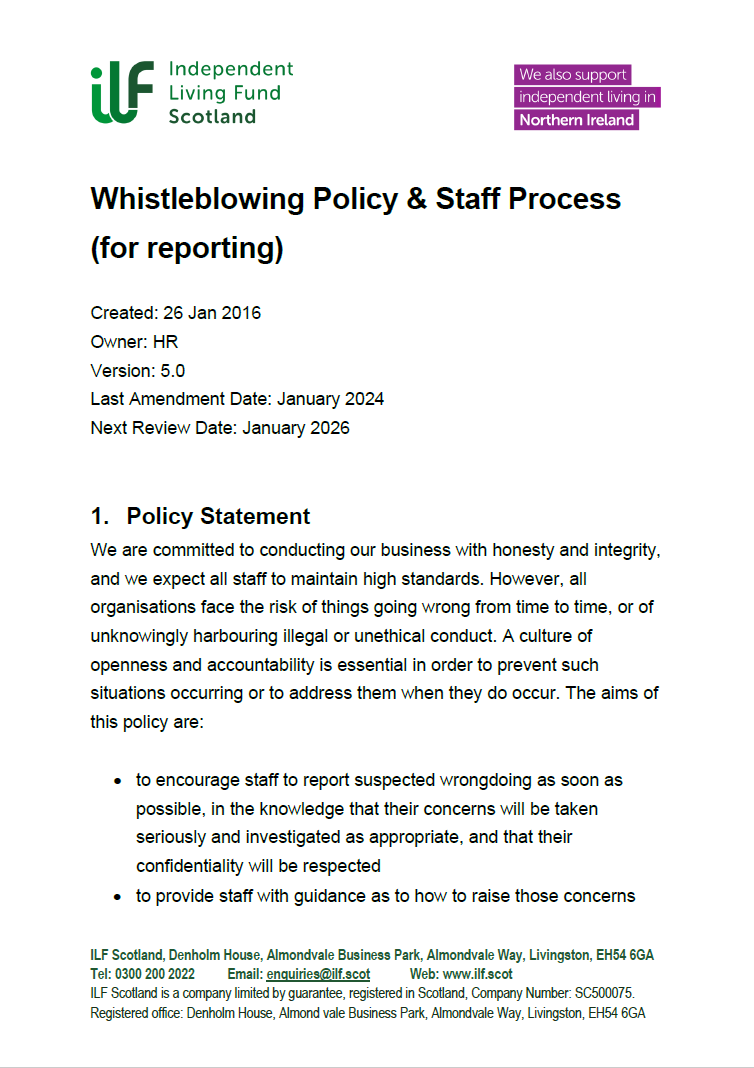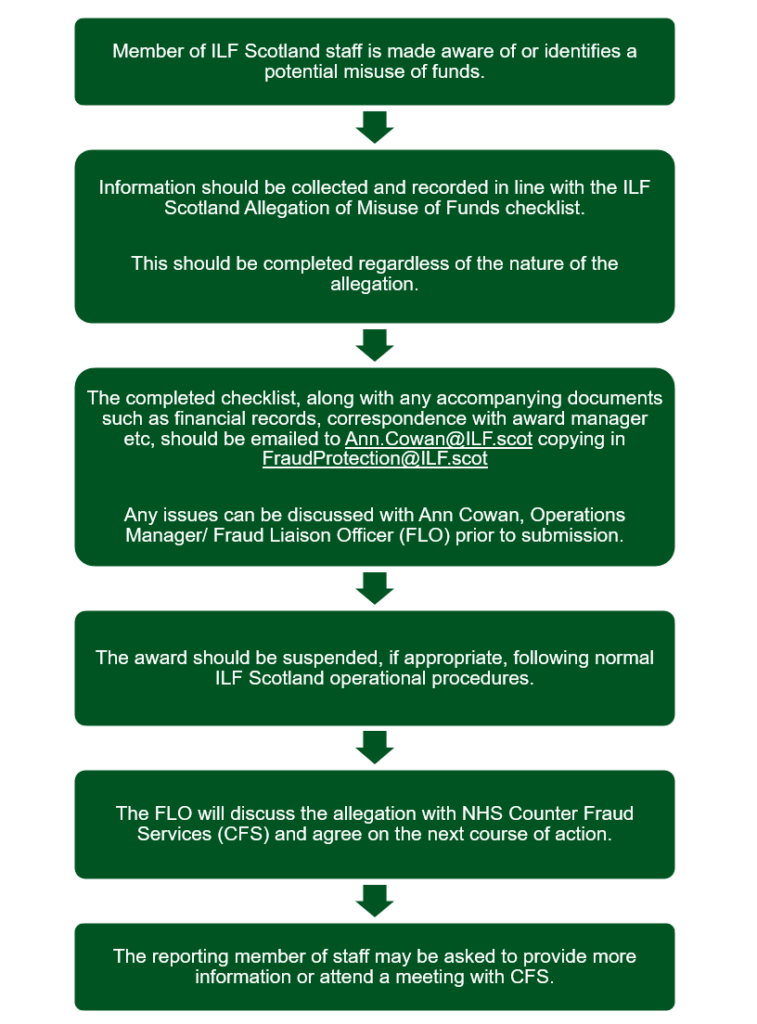
Created: 26 January 2016
Owner: HR
Version: 5.0
Last Amendment Date: January 2024
Next Review Date: January 2026
We are committed to conducting our business with honesty and integrity, and we expect all staff to maintain high standards. However, all organisations face the risk of things going wrong from time to time, or of unknowingly harbouring illegal or unethical conduct. A culture of openness and accountability is essential in order to prevent such situations occurring or to address them when they do occur. The aims of this policy are:
This policy does not form part of any employee's contract of employment and it may be amended at any time.
This policy applies to all individuals working at all levels of the organisation, including senior managers, officers, directors, employees, consultants, contractors, trainees, homeworkers, part-time and fixed-term workers, casual and agency staff, and volunteers (collectively referred to as staff in this policy).
Whistleblowing is the disclosure of information which relates to suspected wrongdoing or dangers at work. This may include:
A whistleblower is a person who raises a genuine concern in the public interest relating to any of the above. If you have any genuine concerns related to suspected wrongdoing or danger affecting any of our activities (a whistleblowing concern) you should report it under this policy.
This policy should not be used for complaints relating to your own personal circumstances, such as the way you have been treated at work. In those cases, you should use the Grievance Procedure.
If you are uncertain whether something is within the scope of this policy you should seek advice from Whistleblowing Officer, whose contact details are at the end of this policy.
We hope that in many cases you will be able to raise any concerns with your line manager. You may tell them in person or put the matter in writing if you prefer. They may be able to agree a way of resolving your concern quickly and effectively. In some cases, they may refer the matter to the Chief Operating Officer or Chief Executive.
However, where the matter is more serious, or you feel that your line manager has not addressed your concern, or you prefer not to raise it with them for any reason, you should contact one of the following (contact details are set out at the end of this policy):
We will arrange a meeting with you as soon as possible to discuss your concern. You may bring a colleague or union representative to any meetings under this policy. Your companion must respect the confidentiality of your disclosure and any subsequent investigation.
We will take down a written summary of your concern and provide you with a copy after the meeting. We will also aim to give you an indication of how we propose to deal with the matter, although that may not always be possible.
We hope that staff will feel able to voice whistleblowing concerns openly under this policy. However, if you want to raise your concern confidentially, we will make every effort to keep your identity secret. If it is necessary for anyone investigating your concern to know your identity, we will discuss this with you.
We do not encourage staff to make disclosures anonymously. Proper investigation may be more difficult or impossible if we cannot obtain further information from you. It is also more difficult to establish whether any allegations are credible and have been made in the public interest. Whistleblowers who are concerned about possible reprisals if their identity is revealed should come forward to the Chief Operating Officer, Chief Executive or Chair and appropriate measures can then be taken to preserve confidentiality. If you are in any doubt, you can seek advice from Public Concern at Work, the independent whistleblowing charity, who offer a confidential helpline. Their contact details are at the end of this policy.
The aim of this policy is to provide an internal mechanism for reporting, investigating and remedying any wrongdoing in the workplace. In most cases you should not find it necessary to alert anyone externally.
The law recognises that in some circumstances it may be appropriate for you to report your concerns to an external body, such as a regulator. It will very rarely, if ever, be appropriate to alert the media. We strongly encourage you to seek advice before reporting a concern to anyone external. The independent whistleblowing charity, Public Concern at Work, operates a confidential helpline. They also have a list of prescribed regulators for reporting certain types of concern. Their contact details are at the end of this policy.
For alleged internal fraud concerns (where you prefer not to speak with the CEO or COO) please contact the CFS (Counter Fraud Service) Intelligence team. Their contact details are at the end of this policy.
Whistleblowing concerns usually relate to the conduct of our staff, but they may sometimes relate to the actions of a third party, such as a customer, supplier or service. The law allows you to raise a concern in the public interest with a third party, where you reasonably believe it relates mainly to their actions or something that is legally their responsibility. However, we encourage you to report such concerns internally first. You should contact your line manager or the Chief Operating Officer for guidance.
Once you have raised a concern, we will carry out an initial assessment to determine the scope of any investigation. We will inform you of the outcome of our assessment where possible. You may be required to attend additional meetings in order to provide further information.
In some cases, we may appoint an investigator or team of investigators, including staff with relevant experience of investigations or specialist knowledge of the subject matter. The investigator(s) may make recommendations for change to enable us to minimise the risk of future wrongdoing.
We will aim to keep you informed of the progress of the investigation and its likely timescale. However, sometimes the need for confidentiality may prevent us giving you specific details of the investigation or any disciplinary action taken as a result. You should treat any information about the investigation as confidential.
If we conclude that a whistleblower has made false allegations maliciously or with a view to personal gain, the whistleblower will be subject to disciplinary action.
While we cannot always guarantee the outcome you are seeking, we will try to deal with your concern fairly and in an appropriate way. By using this policy you can help us to achieve this.
If you are not happy with the way in which your concern has been handled, you may contact the Chief Operating Officer, CEO, Chair of the Board, or our external auditors. Contact details are set out at the end of this policy.
It is understandable that whistleblowers are sometimes worried about possible repercussions. We aim to encourage openness and will support staff who raise genuine concerns in the public interest under this policy, even if they turn out to be mistaken.
Staff must not suffer any detrimental treatment as a result of raising a concern in the public interest. Detrimental treatment includes dismissal, disciplinary action, threats or other unfavourable treatment connected with raising a concern.
If you believe that you have suffered any such treatment, you should inform the Chief Operating Officer, Chief Executive or Chair of the Board immediately. If the matter is not remedied you should raise it formally using our Grievance Procedure.
Staff must not threaten or retaliate against whistleblowers in any way. Anyone involved in such conduct will be subject to disciplinary action.
The Chief Executive has overall responsibility for this policy, and for reviewing the effectiveness of actions taken in response to concerns raised under this policy.
The Chief Operating Officer has day-to-day operational responsibility for this policy and must ensure that all managers and other staff who may deal with concerns or investigations under this policy receive regular and appropriate training.
The Chief Operating Officer, in conjunction with the Chief Executive, should review this policy from a legal and operational perspective at least once a year.
All staff are responsible for the success of this policy and should ensure that they use it to disclose any suspected danger or wrongdoing. Staff are invited to comment on this policy and suggest ways in which it might be improved. Comments, suggestions and queries should be addressed to the Chief Operating Officer.
Whistleblowing Officer
Harvey Tilley
Harvey.Tilley@ilf.scot
CEO
Peter Scott
Peter.Scott@ilf.scot
Chair of the Board
Anne-Marie Monaghan
annemariemonaghan50@gmail.com
Our External Auditors
Deloitte
Tel: 0141 204 2800
Protect (formerly Public Concern at Work)
(Independent Whistleblowing Charity)
Helpline: 020 3117 2520
Website: https://protect-advice.org.uk/
CFS Intelligence – Counter Fraud Service
Tel: 08000 15 16 28
Website: www.cfs.scot.nhs.uk
Please note this process relates specifically to allegations of financial misuse of ILF Scotland funds by a recipient, award manager, carer etc. For any allegations regarding a member of staff please refer to the ILF Scotland Whistleblowing Policy
We have a legal contract with NHS Counter Fraud Services (CFS) to advise and assist with alleged cases of financial misuse by ILF Scotland recipients, award managers, carers etc.
ILF Scotland supports CFS and their objective of ensuring that public funds are deployed for the public good, ensuring effective delivery of frontline care, as the people of Scotland rightly expect. CFS protects Scotland’s public services from financial irregularities by providing a comprehensive range of initiatives to public sector organisations.
They will provide advice to ILF Scotland on whether to pursue an alleged case of financial misuse and the recovery of resources fraudulently obtained from ILF Scotland.
They will also provide specialist advice in relation to counter fraud policy, regulations and guidance as required.
The following flowchart describes the actions required by ILF Scotland staff when receiving a reported suspicion of financial misuse. It advises on the procedure that allows for evidence gathering and collation in a manner that will facilitate informed initial decisions, while ensuring that evidence gathered will be admissible in any possible future criminal or civil actions.
Each situation is different, therefore the guidance in the flowchart will need to be considered carefully in relation to the actual circumstances of each case before action is taken.
In all cases an allegation of financial misuse or other irregularity will be discussed with CFS. If the case includes in it the potential to be prosecuted criminally, then CFS will lead the investigation.
All allegations of fraud and misuse of funds will be recorded on the fraud register that is submitted to the Audit and Risk Committee.
Under no circumstances should a member of ILF Scotland staff speak or write to representatives of the press, TV or radio or post anything on social media about a suspected fraud. Care needs to be taken to ensure that nothing is done that could give rise to an action for defamation.
If you are concerned or believe that any ILF Scotland funding is being misused contact Ann Cowan, Fraud Liaison Officer on 07392 287565 or at Ann.Cowan@ILF.scot

Alt Text:
Box 1: Member of ILF Scotland staff is made aware of or identifies a potential misuse of funds.
Box 2: Information should be collected and recorded in line with the ILF Scotland Allegation of Misuse of Funds checklist.
This should be completed regardless of the nature of the allegation.
Box 3: The completed checklist, along with any accompanying documents such as financial records, correspondence with award manager etc, should be emailed to Ann.Cowan@ILF.scot copying in FraudProtection@ILF.scot.
Any issues can be discussed with Ann Cowan, Operations Manager/ Fraud Liaison Officer (FLO) prior to submission.
Box 4: The award should be suspended, if appropriate, following normal ILF Scotland operational procedures.
Box 5: The FLO will discuss the allegation with NHS Counter Fraud Services (CFS) and agree on the next course of action.
Box 6: The reporting member of staff may be asked to provide more information or attend a meeting with CFS.